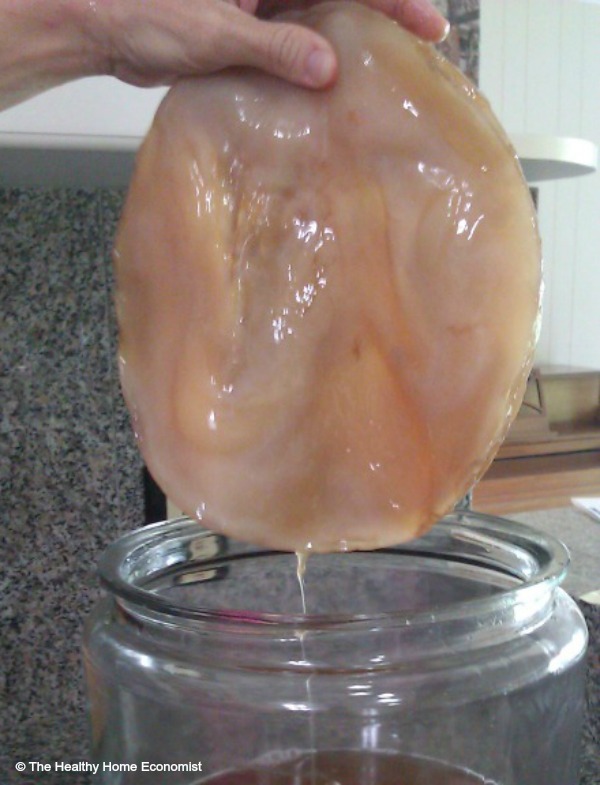Table of Contents[Hide][Show]
 Anyone who has ever brewed kombucha tea knows that the bacterial cellulose that makes up the spongy SCOBY culture is some pretty strong stuff.
Anyone who has ever brewed kombucha tea knows that the bacterial cellulose that makes up the spongy SCOBY culture is some pretty strong stuff.
The material is so strong and flexible that green leaning fashion designers sometimes use it to make kombucha based clothing! In essence, the process is a microbial version of silkworms spinning silk.
Some of these experts speculate that this naturally occurring material could be one of the solutions to the cheap clothing crisis. This global problem is contributing to localized water shortages, pollution, and child labor issues.
Now, scientists are chiming in to say that the humble cellulose found in kombucha could help colonize Mars!
A study published in journal Proceedings of the National Academy of Sciences, suggests that bacterial species found in kombucha tea can be manipulated into microscopic factories that are able to manufacture products made of bacterial cellulose on demand.
The research team from the Centre for Synthetic Biology and Innovation at the Imperial College London named their new bacterial line Komagataeibacter rhaeticus iGEM (K.rhaeticus). Project leader, Michael Florea, headed up the study as part of his undergraduate studies. What started as a student project entered in the 2014 International Genetically Engineered Machine (iGEM) competition (they came in second) has now become a major research paper.
Florea had this to say about his team’s accomplishment:
What makes this approach so promising is that we’ve shown that bacterial cellulose production can be genetically controlled, which means that we grow material with different shapes, patterns and sizes. We can also weave in other proteins and biomolecules, which has never been possible before.
3-D printing using Bacterial Cellulose
Cellulose is already harvested in huge amounts from trees and plants to make disposable materials like paper and cardboard. Harvesting bacterially produced cellulose from cultures like kombucha is more practical in a space environment, however. This is because they grow quickly without the need for much room, soil or sun.
This wonder material is already grown and harvested for use in a wide range of products such as headphones, cosmetics and faux leather. Using it for space travel and exploration is a new concept entirely though!
What has changed is that DNA tools are now available to control and shape bacteria to required specifications. Astronauts could possibly use these tools to grow bacterial cellulose to build essential components. This flexibility would eliminate the need to transport pre-made materials with them.
Another important use could be for water filtration. Bacterial cellulose can woven together and patterned with specific proteins and other biomolecules as it grows. The special weave would serve to bind contaminants and remove them from liquid water. Different filters could be made for specific contaminants with a high selectivity for each depending upon the environmental conditions.
In addition, bacterial cellulose can be manipulated to produce fluorescent proteins when chemicals, metals or biological toxins are detected. A practical commercial application could be as a living fabric that changes color as a warning of hazardous surroundings.
Kombucha in Space
The next step is for researchers to team up with NASA to figure out how to best develop bacterial cellulose in large quantities in a non-Earth environment. Assessing how well such cultures grow and thrive under zero gravity conditions will also be of importance..
It seems that teaching your children how to brew kombucha now qualifies as early training for the astronauts of tomorrow! Growing bacterial cellulose the old fashioned way to make this delicious beverage might even make a great Science Fair project.
Talk about using the wisdom of the past to pave the way of the future!
Sarah, The Healthy Home Economist








I have studied the antimicrobial activity of the kombucha SCOBY against pathogenic bacteria and pathogenic yeasts and the results have been excellent.
Hmm, well that was interesting. Who knew?
Hi,
I’ve had a natural health practitioner say to stop drinking kombucha because in his opinion it is toxic. I was shocked when I heard this because I’ve always loved kombucha. Do you have any comments on this?
Now I’m confused!
Carole
I wonder what research he has to back up his claim? Kombucha has been consumed for hundreds if not thousands of years. I’ve been personally drinking it for nearly 15 years with beneficial results (always consuming in moderation and skipping the high sugar versions at the store).
Hey Sarah, I was gonna ask something similar…I just read on another blog that I also have great respect for, that kombucha and other fermented foods are high in histamines and therefore not good for a certain population that has to be careful of them. Any thoughts? Thanks! Always love your info! E
If you can’t tolerate histamines, then kombucha might cause a problem although it isn’t as high in histamines as many other foods like sauerkraut. If you don’t tolerate it, then by all means don’t drink it. Histamines can also cause acne issues: https://www.thehealthyhomeeconomist.com/histamine-intolerance-fermented-foods-acne/
Wow,really, it will be amazing, well i considered myself into the project, my scooby is huge and healhty